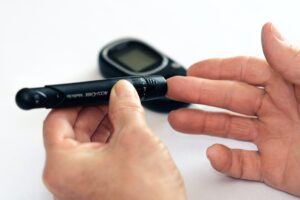Type 2 Diabetes Continues to Soar
The number of people in America with diabetes continues to soar. About 11% of Americans have diabetes and 90-95% of those people have type 2 diabetes. How can you prevent it and is there such a thing as type 2 diabetes remission?
People can reverse or halt the progressive course of type 2 diabetes if there is early detection in conjunction with long-term weight loss, physical activity, and balanced eating. Prediabetes, defined as a hgbA1c of 5.7% – 6.4%, is a risk factor for the progression of diabetes. It is associated with obesity, high blood pressure, and elevated lipids. Elevation of hgbA1c even close to this range is a call for action.
 What is Prediabetes?
What is Prediabetes?
Let’s talk a little more about what prediabetes is, its Causes, Signs, and Symptoms. Research how people can actually achieve a type 2 diabetes remission.
Prediabetes is a condition where blood glucose levels (blood sugar) are higher than normal, but not high enough yet to be diagnosed as type 2 diabetes. Nearly 1 in 3 Americans have prediabetes and more than 80% of those people don’t even know it. Prediabetes puts you at increased risk of developing type 2 diabetes, stroke, and heart disease.
Good news! If you have prediabetes, you can make lifestyle changes to prevent type 2 diabetes and other serious health problems. A Registered Dietitian Nutritionist is key to helping you change your habits and prevent these health issues.
What Causes Prediabetes?
Insulin is a hormone produced by the pancreas that helps blood sugar enter your cells to use for use as energy. If you have prediabetes, the cells in your body don’t respond as they should to insulin. More insulin is made by the pancreas to try to get your cells to respond normally.
This creates a vicious cycle where your pancreas eventually cannot keep up with demand and blood sugar rises which sets the stage for prediabetes and type 2 diabetes down the road.
Signs and Symptoms of Prediabetes
You can have prediabetes without knowing it or even having symptoms. A routine blood test is recommended if you have any of the following risk factors:
- Being overweight
- <45 years old
- Family history (parent, brother, or sister with type 2 diabetes)
- Lack of physical activity (<3 times per week)
- Gestational diabetes
- Polycystic ovary syndrome
- Race: African Americans, Hispanic/Latino Americans, American Indians, Pacific Islanders, and some Asian Americans are at higher risk
 Remission or Cure?
Remission or Cure?
People can reverse or halt the progressive course of type 2 diabetes if there is early detection in conjunction with long-term weight loss, physical activity, and balanced eating. Prediabetes, defined as a hgbA1c of 5.7% – 6.4%, is a risk factor for the progression of diabetes.
Prediabetes is associated with obesity, high blood pressure, and elevated lipids. Elevation of hgbA1c even close to this range is a call for action. As previously discussed, type 2 diabetes remission is possible with lifestyle intervention.
However, it can recur if the factors that led to it in the first place are once again present. Remission can be defined as hemoglobin A1c 6.5% or below and constant for at least 3 months without the use of glucose-lowering medications. Six months of initiating lifestyle intervention are needed before A1c is evaluated.
Despite all those efforts, if weight loss is not maintained and glucose tolerance decreases over the years it is quite possible to meet the criteria for prediabetes and type 2 diabetes again.
Start your Journey to Health Today!
A dietitian’s role is to help the client achieve weight loss and maintain it long-term. Studies show that weight loss as little as 3% to 10% of initial body weight can result in remission if done early in the course of the disease.
Some tips that can help are to focus on what you want to include in your diet instead of excluding it. Balance out carbohydrate-containing foods at meals and snacks that contain sufficient fiber. Engage in consistent physical activity and maintain a healthy weight.
Personalized nutrition recommendations on diet, exercise, weight loss/maintenance, stress management, and blood glucose patterns from a Registered Dietitian Nutritionist of Certified Diabetes Care and Education Specialist are a great way to get started on the right path!
Please schedule your appointment today with Julianne Downes, RDN, LDN, a Dietitian, Nutritionist, and Certified Diabetes Care and Education Specialist, or Laura Walsh, RDN, LDN. They can help you change habits and work towards type 2 diabetes remission.
In addition, we are in the network for Blue Cross Blue Shield of Illinois and United Healthcare. Please reach out to your provider to verify benefits and make your appointment today.
